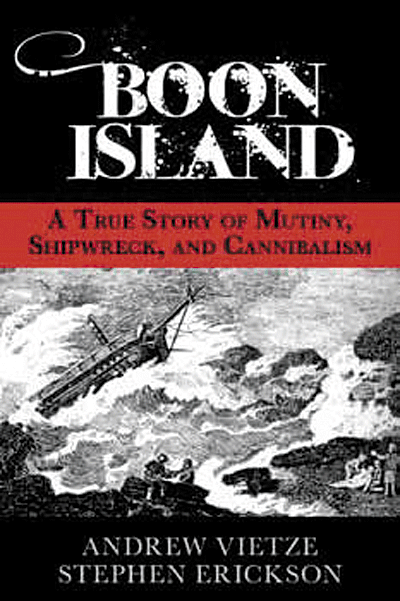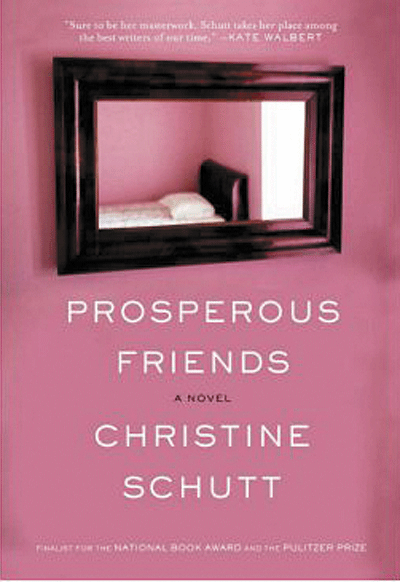BOON ISLAND: A TRUE STORY OF MUTINY, SHIPWRECK, AND CANNIBALISM
By Andrew Vietze and Stephen Erickson
Globe Pequot Press, 2012
224 pages, $16.95
ISBN 978-0-7627-7752-5
The coast of New England is no stranger to horrifying and tragic tales of shipwreck and misery, but the wreck of the Nottingham Galley on Boon Island in 1710 still remains as one of the most bizarre, intriguing and mysterious shipwrecks on this coast.
“Boon Island” is the collaborative effort of two excellent New England historians: Andrew Vietze, of Appleton, and Stephen Erickson, of Portsmouth, N.H. Vietze is also the award-winning author of “Becoming Teddy Roosevelt (Down East Books, 2010).
Maine’s famous novelist Kenneth Roberts wrote about this 1710 shipwreck in his classic 1955 work also called “Boon Island,” but Vietze and Erickson reveal that there is much more to the story than even Roberts understood.
This is a well-researched and smartly presented history that reads like a novel, a maritime mystery of dishonor, death, suspicious motives, mutiny and cannibalism, as well as the fascinating and unique public relations battle that exposed the truth, the lies and the hypocrisy of the participants and the times.
The authors vividly describe the nighttime wreck of the Nottingham Galley on the barren rock of Boon Island during the bitter winter of December 1710. All 14 crewmen survived the wreck, only to suffer grievously from freezing, wet weather, starvation and despair until their dramatic and timely rescue in January 1711 (although not everyone was still alive by then).
They tell of the captain’s odd behavior after rescue — disgraceful and suspicious — leading to an investigation that uncovered possible insurance fraud, collusion with an enemy, brutality, mutiny and outright self-serving lies. The lurid, damaging public accusations between the captain and his crew captivated London — their “dueling documents helped make the story of Boon Island the most famous tale of mutiny and shipwreck of the eighteenth century” (until the HMS Bounty in 1789).
PROSPEROUS FRIENDS
By Christine Schutt
Grove Press, 2012
205 pages, $24
ISBN 978-0-8021-2038-0
An old Spanish proverb says: “There is no happiness; there are only moments of happiness.” If that is true, then the two couples in this cheerless story have used up any remaining moments they had left.
“Prosperous Friends” is Blue Hill author Christine Schutt’s penetrating novel about love, marriage, infidelity and the sad recognition that most people are only as happy as they’ve already made up their minds to be. Schutt is an award-winning author of two novels and two story collections, and was a Pulitzer Prize finalist for fiction in 2009.
Readers looking for a light-hearted read won’t find it here. Instead, Schutt’s story is a depressing indictment of marriage and fidelity, a sober realization that “there may be cures for loneliness, but marriage is not one of them.” However, Schutt’s narrative is powerful and evocative, and reveals just how fragile human relationships can be.
Ned and Isabel Bourne are in their 30s, married and supremely unhappy. He is a sexually frustrated writer of declining success. She is lonely and unfulfilled, and not very good at pretending she’s happy with her marriage, her husband or her life of unkept promises.
Clive and Dinah Harris are older, comfortable in sustaining a marriage of convenience. He is a famous painter and serial philanderer. She is a poet with remarkable patience and tolerance.
When these two couples meet, the fractures in their relationships widen and expose bitterness, despair and desperation, resulting in anger, guilt and substance abuse (pills, laxatives and booze with breakfast).
One marriage breaks up painfully, the other plods along in smug self-denial and nobody feels any better about it.
These vividly drawn characters may be small, selfish people, but their self-induced flaws are all too real. And nobody is happy here.
— Bill Bushnell lives and writes in Harpswell
Copy the Story LinkSend questions/comments to the editors.




Success. Please wait for the page to reload. If the page does not reload within 5 seconds, please refresh the page.
Enter your email and password to access comments.
Hi, to comment on stories you must . This profile is in addition to your subscription and website login.
Already have a commenting profile? .
Invalid username/password.
Please check your email to confirm and complete your registration.
Only subscribers are eligible to post comments. Please subscribe or login first for digital access. Here’s why.
Use the form below to reset your password. When you've submitted your account email, we will send an email with a reset code.